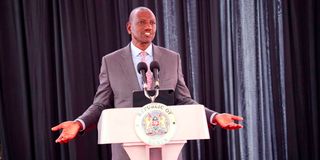World Bank, MPs warn tax raises will hurt economy

President William Ruto during the launch of Isuzu East Africa's first-ever electro-deposition paint plant in sub-Sahara Africa at their headquarters in Nairobi on June 7, 2023.
The World Bank has warned that the spate of taxes set to be introduced by President William Ruto’s government could be counterproductive as the resulting higher cost of goods and services could reduce demand and hence tax collection.
A Parliamentary committee has also cautioned the President against the “ambitious” taxation plan, saying the economy is in bad shape and cannot yield the revenues he targets to raise through taxing Kenyans more.
President Ruto has lined up a number of tax measures in the Finance Bill, 2023 to finance his maiden budget of Sh3.679 trillion for the 2023/24 financial year.
World Bank analysts say private consumption could fall in the medium term as a result of higher taxation, at a time when inflation has already pushed up the cost of goods and services sharply.
Slowdown
“On the demand side, we are likely to see a slowdown in private consumption in the medium term due to higher taxation, which could lower economic expectations,” said Naomi Mathenge, a senior economist at the World Bank.
The World Bank’s latest Kenya Economic Update report also notes that high commodity prices, triggered by the Ukraine-Russia war have had a negative impact on consumption in 2022, as private sector firms recorded a decline in sales.
“Private consumption is expected to remain on a robust growth path, although it will be dampened in the near term by ongoing tax reforms to raise revenue and support fiscal consolidation,” the lender said.

Higher prices of commodities such as food, fuel, electricity and cooking gas are jeopardising business and household spending, which is affecting the collection of taxes.
“Private consumption (which accounted for about 62 per cent of output growth in 2021) slowed markedly in 2022 as rising domestic prices and a decline in agricultural output eroded disposable incomes,” the report notes.
The Finance Bill 2023 has a litany of tax proposals, including the introduction of a new statutory deduction of 3 per cent into the National Housing Development Fund, an increase in VAT on petroleum products to 16 per cent from 8 per cent, excise duty on mobile money transfers from 12 per cent to 15 per cent, a 10 per cent excise tax on mobile phones, a 5 per cent excise tax on several cosmetic products and a 3 per cent turnover tax on small enterprises with annual revenues of between Sh500,000 and Sh1 million.
Kenya’s total revenue and grants grew by 10.6 per cent in the first nine months of FY2022/23, down from 21.9 per cent in the previous year. The World Bank attributed the moderate revenue growth to the subdued performance of economic activities from July to December 2022, and sluggish growth in employment and household consumption.

A pump attendant at the Rubis Energy Petroleum Station on Koinange Street in Nairobi County on May 15, 2023. The World Bank has warned that the spate of taxes set to be introduced by President William Ruto’s government could be counterproductive as the resulting higher cost of goods and services could reduce demand and hence tax collection.
The National Treasury targets to collect Sh2.57 trillion in taxes in 2023/24, through proposals to squeeze an extra Sh230 billion from taxpayers contained in the Finance Bill 2023. The revenue projection is 17 per cent higher than the expected ordinary revenue during 2022/23.
“The committee notes with concern that this revenue target is quite ambitious, taking into account that historically, ordinary revenue has grown at an average of around 10 per cent. Further, the downward revision of GDP growth projection is indicative of a concomitant reduction in revenue collection,” the committee said in its report on the estimates of revenue and expenditure for 2023/24 and the medium term.
Economic hardships
The report tabled in the House on Tuesday further notes that economic hardships due to high inflation and Kenya’s weak currency worsen the situation.
Prices of goods in the country continue to be high and are a pain point for households, mainly food items. The Kenya National Bureau of Statistics reported that in May, inflation averaged 8 per cent, rising from 7.9 per cent in April. The rate has remained north of the 7.5 per cent upper limit as per the Central Bank of Kenya’s measure since June last year.
“The economic outlook remains uncertain due to significant internal and external shocks and this may have a bearing on revenue collection and financing of the budget,” the committee stated.
The committee further warned that the government’s ambitious revenue targets could result in a supplementary budget within the financial year, or more borrowing since failure to hit revenue targets would widen the budget deficit.
In the same report, the MPs also now want Treasury to report on the distribution of national projects across counties to establish areas that may have been favoured as others suffered during the former regime.
The committee said it wants to ensure that “the budget is proportionately distributed across the country.”






